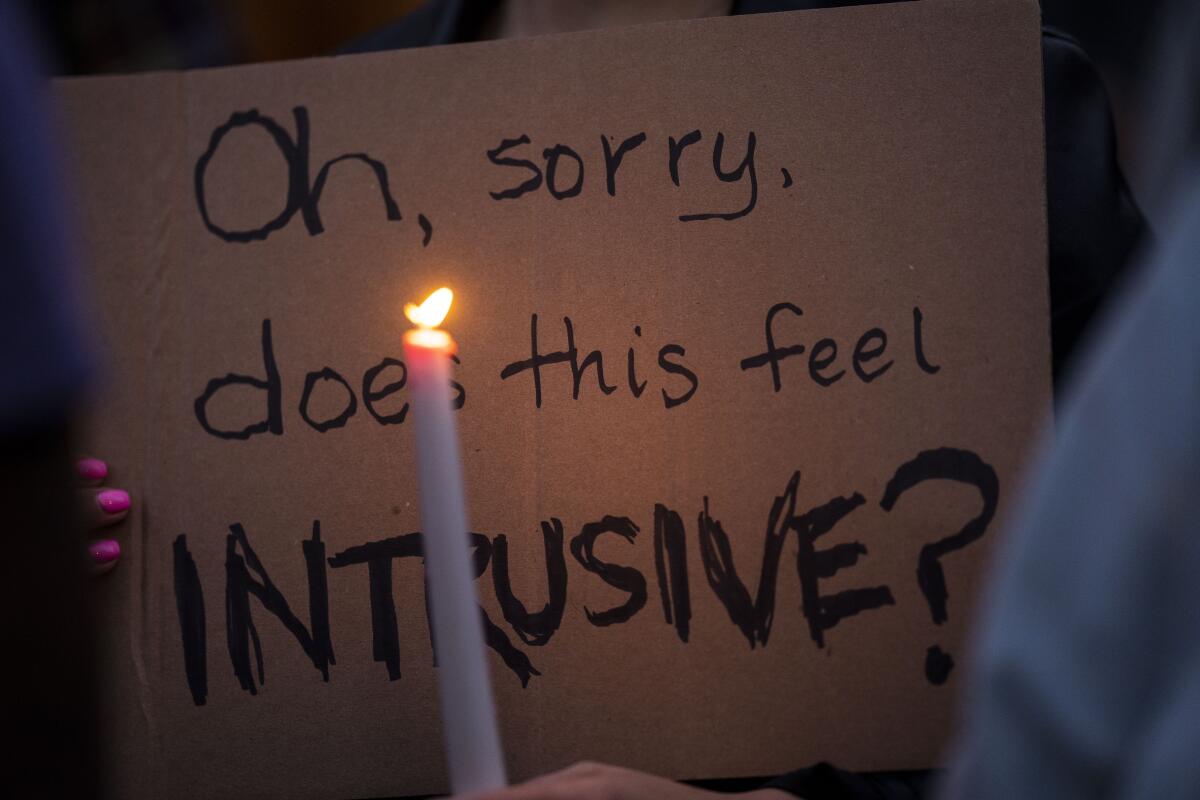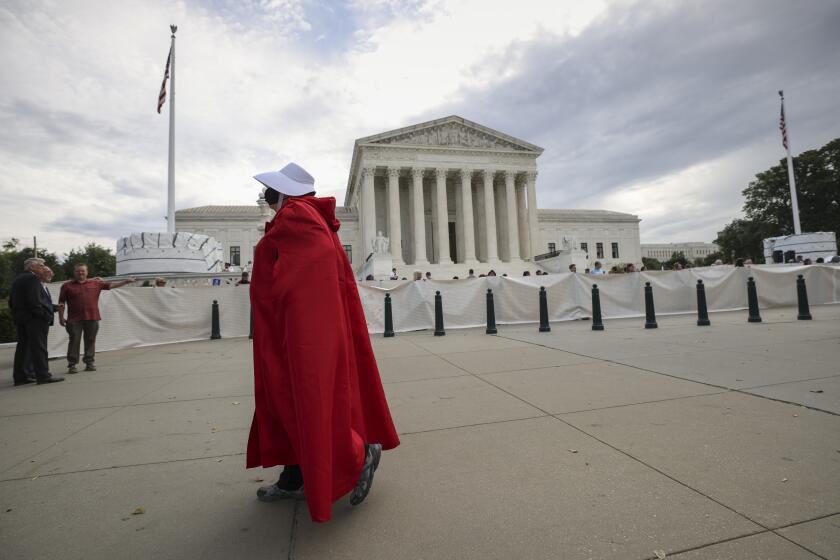Column: We’re not as pious as we used to be, and this terrifies Justice Alito

Call it the Alito Fallacy.
Earlier this month, Supreme Court Justice Samuel A. Alito Jr. was in Rome, where he delivered a keynote speech at Notre Dame Law School’s Religious Liberty Summit.
Among the anecdotes he shared: Some years ago, at a museum in Berlin, he saw a little boy point to a wooden crucifix and ask his mother, “Who is that man?”
He did not report what the mother told her son, but he was apparently taken aback enough to read something ominous into the child’s innocent question.
“That memory has stuck in my mind as a harbinger of what may lay ahead for our culture,” said Alito, who is Catholic.
What terrible thing lies ahead?
Alito apparently concluded from the museum exchange that religious liberty is in terrible danger because people are not as pious as they used to be.
“It is hard to convince people that religious liberty is worth defending if they don’t think religion is a good thing that deserves protection,” he said, and warned about a “growing hostility” to religion, “or at least to traditional religious beliefs that are contrary to the new moral code that is ascendant in some sectors.”
This is silly. Religious persecution has been a part of American history since the beginning and continues unabated to this day. People with old moral codes, i.e. religious people, are often the worst offenders when it comes to religious tolerance. Just ask the folks who wanted to build an Islamic community center and mosque in New York City near 9/11’s ground zero.
The unspeakable cruelty of Republican states without rape and incest exceptions for abortion.
Anyway, Alito is engaging in a classic case of projection here: He’s attributing to others what he himself is doing.
In a country founded on the bedrock principle of the separation of church and state, he and his ultra-religious colleagues have been busy cramming Catholic and evangelical Christian beliefs down the throats of all Americans.
It was bad enough a few years ago when the court decided an employer’s religious beliefs trump an employee’s right to contraception coverage.
But in the past few months, the court’s conservative supermajority has really gone to town on the 1st Amendment. Justices decided that a Christian public school coach can hold what are practically religious revivals on the football field after games.
The court ruled that Maine engaged in religious discrimination when it refused to extend tuition aid to students to attend private Christian schools if the state provides it to similar private schools.
Worst of all, the justices imposed their Christian religious beliefs on the wombs of American women, stripping away the nearly 50-year-old federal right to abortion. (I’m sure the majority believed that striking down Roe vs. Wade was a principled constitutional stand; however, it was nothing more than the imposition of religious zealotry on a population that by a wide margin believes abortion should be legal.)
Endless mass shootings, police killings and the end of nationwide abortion rights. No wonder celebrating America seems like a sick joke right now.
By elevating the Christian faith, Alito and his fellow conservative justices have put religious rights on a collision course with the Constitution.
Last week, in fact, my colleague Deborah Netburn wrote about a Florida rabbi who filed a religious liberty lawsuit challenging that state’s ban on abortion after 15 weeks of pregnancy.
The rabbi, who is also a civil rights attorney, Netburn wrote, “tells his congregation that contrary to Roman Catholic and evangelical teachings, which state that life begins at conception, traditional Jewish law, known as halacha, says life begins at birth: when the baby draws its first breath. Before then, the mother’s physical and emotional well-being is paramount.”
Similarly, she wrote, in the Muslim faith, a fetus is not considered ensouled until 120 days after conception.
How can these different beliefs be reconciled with the many state legislatures that are moving, or have already moved, to outlaw access to abortion, sometimes even in the case of rape, incest or when the life of the pregnant person is in danger? The question of when life begins, after all, is theological or moral, not scientific.
As the Supreme Court continues to privilege Christian belief in its rulings, is it any wonder that ultra-right Christian elected officials feel free to openly criticize the great American tradition of keeping religion out of government and vice versa?
“I’m tired of this separation of church and state junk,” Republican U.S. Rep. Lauren Boebert of Colorado said recently as she shared her “personal testimony” with congregants of the Cornerstone Christian Center in tiny Basalt, Colo. “The church is supposed to direct the government,” she said. “The government is not supposed to direct the church. That is not how our Founding Fathers intended it.”
I’m waiting for the historical citation on that one.
Boebert’s fellow Republican dingbat, Rep. Marjorie Taylor Greene of Georgia, is marching in lockstep.
“We need to be the party of nationalism, and I’m a Christian, and I say it proudly, we should be Christian nationalists,” Greene said a little over a week ago.
Just as the election of the first Black president unleashed a powerful backlash against racial progress, it’s possible that the shameless embrace of Christian nationalism is an overreaction to the increasing secularization of the American population.
A recent Gallup poll found that belief in God in the U.S. is at an all-time low (although it’s still at 81%).
And membership in houses of worship fell below 50% for the first time since Gallup began keeping track eight decades ago.
I had to laugh when Justice Alito mused to his audience in Rome about what historians will say centuries from now about the United States’ contribution to civilization. “One thing I hope they will say is that our country ... eventually showed the world that it is possible to have a stable and successful society in which people of diverse faiths live and work together harmoniously and productively while still retaining their own beliefs,” he said.
Keep wishing, Justice Alito. Your court’s recent rulings are a rebuke to your high-minded words.
More to Read
A cure for the common opinion
Get thought-provoking perspectives with our weekly newsletter.
You may occasionally receive promotional content from the Los Angeles Times.














